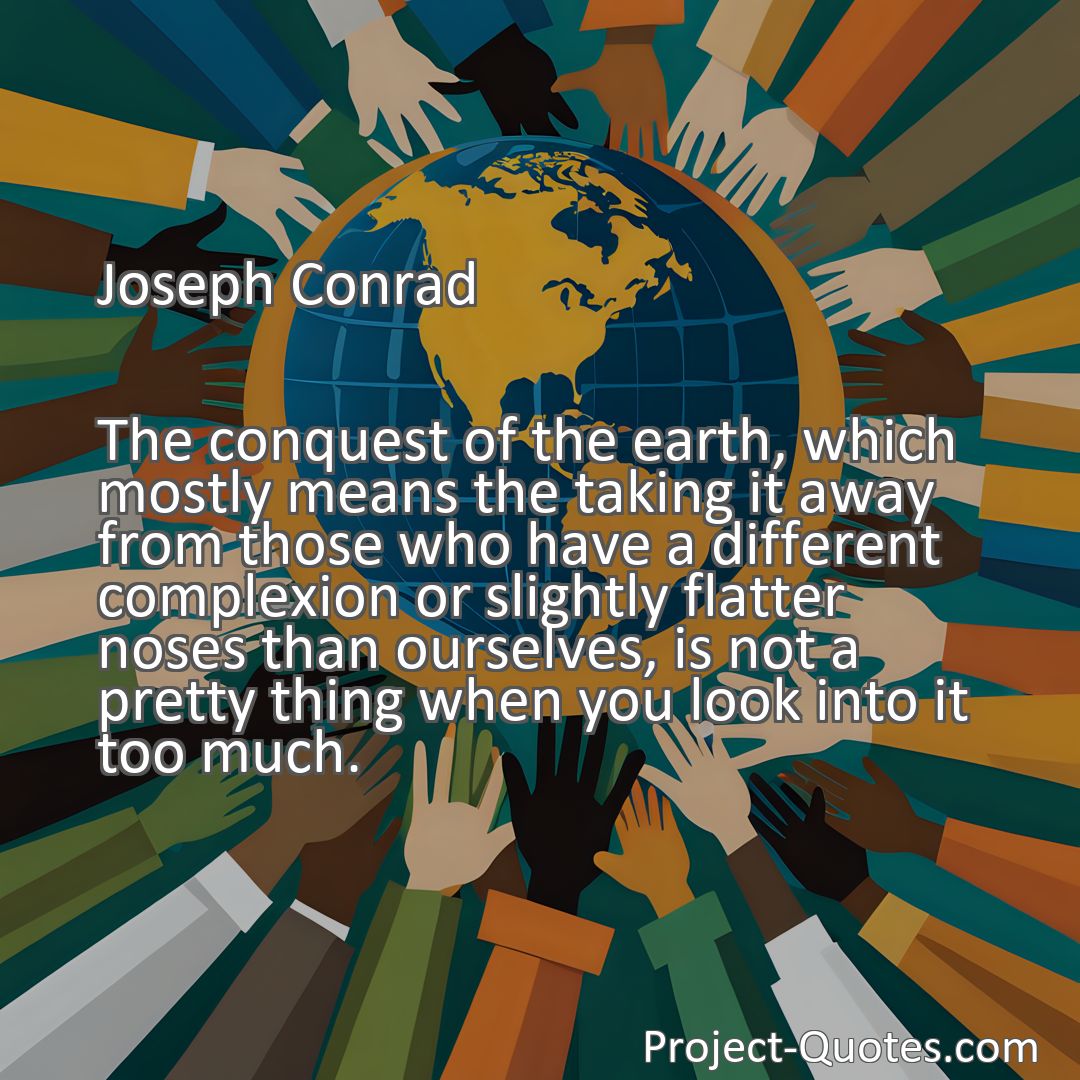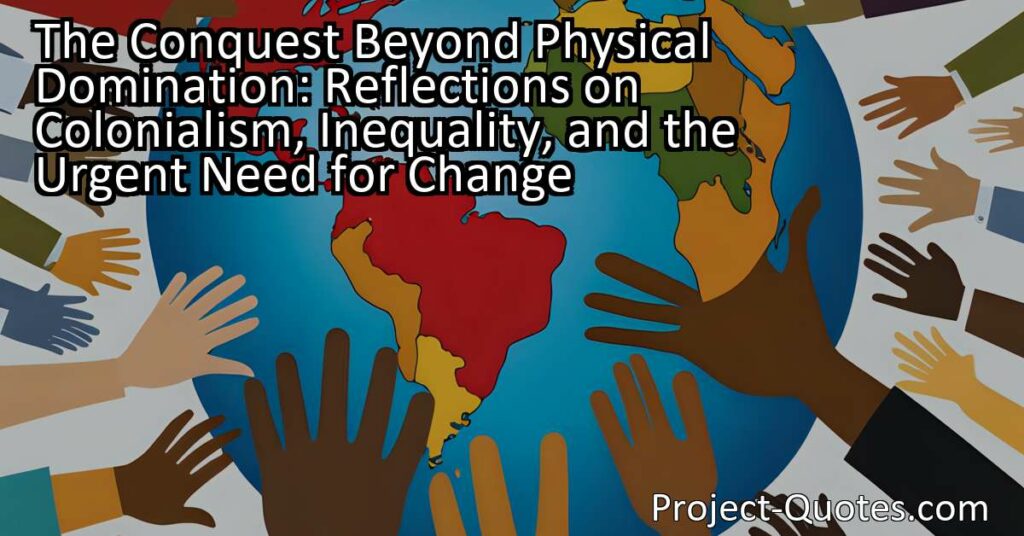The conquest of the earth, which mostly means the taking it away from those who have a different complexion or slightly flatter noses than ourselves, is not a pretty thing when you look into it too much.
Joseph Conrad
Conquest Extends Beyond Physical Domination: Understanding the Historical and Psychological Impacts of Colonialism and the Urgent Need for Change. Joseph Conrad’s quote sheds light on the deep-seated prejudices and power dynamics that fueled colonialism. By acknowledging the lasting effects and promoting education, diversity, and inclusion, we can work towards dismantling systems of inequality and creating a more compassionate future. The conquest of the earth goes beyond physical control and requires a reflection on the impact of our actions.
Table of Contents
- 1 The conquest of the earth, which mostly means the taking it away from those who have a different complexion or slightly flatter noses than ourselves, is not a pretty thing when you look into it too much.
- 2 Joseph Conrad
- 3 Meaning of Quote – The conquest of the earth, which mostly means the taking it away from those who have a different complexion or slightly flatter noses than ourselves, is not a pretty thing when you look into it too much.
- 4 Freely Shareable Quote Image
- 5 Related
Meaning of Quote – The conquest of the earth, which mostly means the taking it away from those who have a different complexion or slightly flatter noses than ourselves, is not a pretty thing when you look into it too much.
The renowned writer Joseph Conrad once stated, “The conquest of the earth, which mostly means the taking it away from those who have a different complexion or slightly flatter noses than ourselves, is not a pretty thing when you look into it too much.” These words ponder upon the uglier side of humanity’s relentless pursuit to dominate the world around them. While it is a sentiment that may seem harsh, it holds great significance in shedding light on the injustices and inequalities that have been perpetuated throughout history.
Conrad’s quote sheds light on the dark and often ignored truths about colonialism and imperialism. The conquering of lands and subjugation of people have not simply been about geographical expansion, but about overpowering those who are perceived as different. We must recognize that this is not only an issue of color or physical traits, but of deep-seated prejudice and the need for power that has plagued humanity for centuries.
One cannot deny the staggering impact that colonialism has had on the world. The consequences of European powers spreading their dominance across continents can still be felt today. The repercussions of their actions can be seen in the disparity that exists between formerly colonized regions and their colonizers. The economic, social, and cultural imbalances that have been created are still deeply ingrained in societies, hindering progress and perpetuating a cycle of unequal power dynamics.
Throughout history, the quest for domination has led to countless atrocities and human suffering. From the enslavement of African peoples to the exploitation of indigenous communities, the conquerors have often treated those they subjugated as less than human. The scars of these actions persist, and it is crucial that we acknowledge and learn from them.
In examining Conrad’s quote, it is important to recognize that it not only applies to past colonizers but can also be relevant to modern-day societies. Though the methods may have changed, the fundamental desire to control and impose one’s will upon others remains present. The complexities of power imbalances can manifest themselves in various ways, from economic inequality to racial discrimination.
The concept of conquest extends beyond physical domination; it also encompasses the psychological and emotional realms. The colonial mindset, which places certain cultures and races as inferior, has far-reaching effects. It perpetuates a sense of otherness, leading to the marginalization of certain groups and the reinforcement of stereotypes. This mentality has a lasting impact on individuals, as it shapes their self-perception and their place in society.
But it is not all doom and gloom. Conrad’s words also serve as a reminder that raising awareness and questioning the motives behind conquest can pave the way for change. Understanding the detrimental effects of this desire for dominance can lead to efforts to rectify historical wrongs and create a more equitable future.
Education plays a vital role in combating the negative consequences of conquest. By teaching young minds about the harsh realities of history, we can help them develop empathy and an understanding of the importance of equality. Empowering individuals to challenge societal norms and prejudices can result in a more inclusive and just world.
Additionally, promoting diversity and inclusion in all aspects of society can counteract the notion that there is one dominant group that must conquer and control. Embracing the richness of different cultures and perspectives fosters a more harmonious coexistence.
It is essential to remember that the conquest of the earth only leads to greater division and suffering. By acknowledging the harm caused by historical conquests and striving for a more balanced and empathetic world, we can begin to dismantle the systems that uphold inequality. Conrad’s quote serves as a powerful reminder of the urgent need for change and the importance of reflecting on the impact our actions can have on others.
In conclusion, Joseph Conrad’s words offer a poignant reflection on the darker aspects of human nature and its historical consequences. The conquest of the earth, with its underlying motives of domination and discrimination, has left indelible marks on society. Through education, acknowledgment, and a commitment to equality, we have the power to learn from the mistakes of the past and build a more compassionate and equitable future for all.
I hope this quote inspired image brings you hope and peace. Share it with someone who needs it today!


